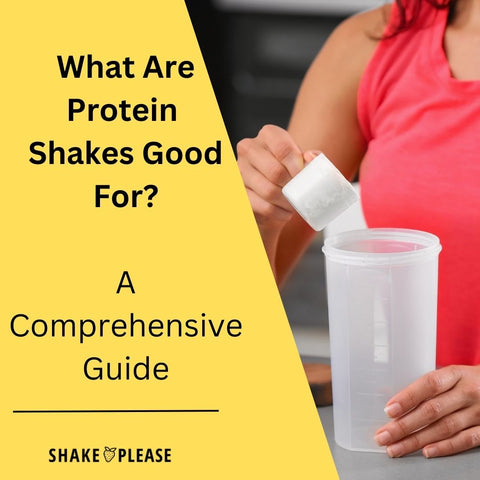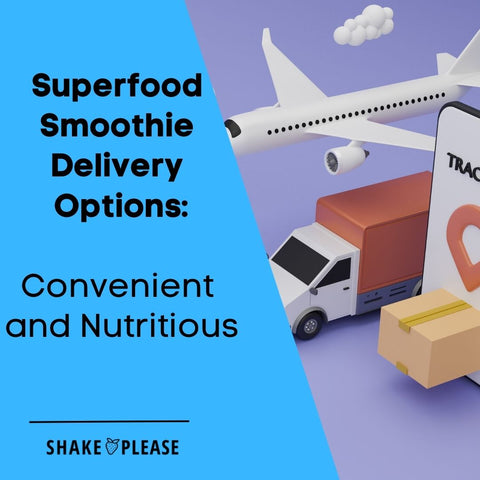
Protein shakes have become a popular way of adding more protein into one's daily routine. Whether that be building muscle, weight loss or simply adding more into your daily meal plan. We will explore the role of protein shakes and how they can support health and fitness goals in this article.
Introduction
Protein shakes are nutritional beverages designed to deliver an ample dose of protein.
Commonly created by mixing protein powder with water or milk as the liquid base. Protein shakes provide individuals with an easy way to increase their protein consumption and potentially reap many benefits.
Types of Protein Shakes
Protein shakes come in many different varieties, each offering distinct properties and sources of protein. Some common options are:
Whey Protein Shakes
Whey protein shakes and smoothies have become one of the most sought-after protein supplement options due to their high quality protein content and fast absorption rate. Derived from milk, this dairy-derived substance provides all nine essential amino acids required for muscle growth and repair.
Casein Protein Shakes
Casein protein shakes, made from milk, are well known for their slow digestion rate and release of amino acids slowly into your muscles over an extended period - such as during sleep. Therefore, they're ideal for providing continuous protein supply throughout the night to sustain muscle tissue health.
Soy Protein Shakes
Soy protein shakes can be an ideal source of complete proteins that contains all essential amino acids for easy digestion. Soy is one of the only plant sources with complete proteins such as this that are suitable for vegetarian and vegan lifestyles, and are easily digestible.
Plant-Based Protein Shakes
Protein shakes made with plant-based sources like pea, hemp or brown rice have become increasingly popular with individuals seeking a more sustainable and plant-focused lifestyle. Offering an alternative for individuals who may have specific dietary restrictions or restrictions.
Protein Shakes for Muscle Building
Protein is essential in muscle building and repair. Through strength training or intense physical activity, muscle fibers experience microtears; protein shakes offer invaluable assistance in supporting their repair. Protein shakes may assist muscle building by:
Importance of Protein for Muscle Growth
Protein contains amino acids, the building blocks of muscle tissue. Eating enough protein will provide your body with enough essential amino acids for muscle repair and growth.
How Protein Shakes Assist Muscle Recover and Repair
Protein shakes provide a fast and convenient way of providing our bodies with concentrated doses of protein. After an intense workout session, sipping on one can kick-start the recovery process by providing essential amino acids directly to muscles for recovery and repair.
Recommended Protein Intake for Muscle Building
Individuals looking to gain muscle have different protein needs depending on factors like their body weight, activity level and goals. Generally, it is suggested to consume 0.7 to 1 gram of protein per pound of body weight – Protein shakes may help meet this target more efficiently!
Protein Shakes for Weight Loss
Not only can protein shakes aid in muscle building, they can also be an invaluable aid for weight management by:
Protein's Role in Weight Management
Compared with carbohydrates or fats, protein provides greater satiety value, helping you feel full for longer. This can contribute to reduced caloric intake and thereby assist weight loss efforts.
How Protein Shakes Can Help Control Appetite
Consuming protein shakes as meal replacements or snacks is an excellent way to curb cravings and lower overall calorie consumption. Replacing unhealthy snacks with these protein beverages can support individuals in reaching their weight loss goals more efficiently.
Integrating Protein Shakes Into a Balanced Diet for Weight Loss
To successfully lose weight, it is essential to eat a well-rounded diet with ample essential nutrients. Protein shakes can form part of an effective meal plan complementing other healthy food choices.
Protein Shakes for Fitness and Performance
Protein shakes can not only aid muscle building and weight loss but can also play a crucial role in increasing fitness performance. They may help with energy levels, exercise recovery and physical endurance: All essential elements for improving fitness performance.
Enhancing Energy Levels and Stamina
Protein provides sustained release of fuel during physical activity. Protein shakes containing both carbs and protein can be consumed as pre-workout drinks to maintain energy levels and stamina during workout sessions.
Exercise Recovery and Muscle Soreness
Exercising hard can leave muscles damaged and sore, so recovery protein shakes that contain the appropriate combination of protein and carbs may aid in muscle recovery, reduce soreness, and speed healing time.
Protein Shakes as a Convenient Post-Workout Option
After exercising, replenishing the body with essential nutrients to promote optimal recovery is vitally important. Protein shakes offer an easy and rapid-absorption option to quickly deliver essential amino acids directly into the muscles for healing purposes.
PROTEIN 101: IS PROTEIN A SUPERFOOD?
Protein Shakes for Vegetarians and Vegans
Meeting your protein requirements without turning to animal sources can be difficult when living a vegetarian or vegan lifestyle, making protein shakes an invaluable way to meet protein requirements without eating animals directly.
Meeting Protein Requirements without Animal Products
Plant-Based Protein Shakes Can Fill Vegetarian and Vegan Requirements Vegetarian and vegans who do not consume animal products have an excellent option available to them to meet their protein requirements: plant-based protein shakes derived from sources like peas, hemp or brown rice can provide a complete amino acid profile.
Plant-Based Protein Shake Options for Vegetarians and Vegans
There are various plant-based protein shake options on the market that cater specifically to vegetarians and vegans, providing enough protein without including animal products in their composition.
Importance of Checking the Ingredients for Allergens or Sensitivities
Individuals with allergies or sensitivities should carefully read labels of protein shakes they purchase, as some contain common allergens such as soy, nuts or gluten that could pose health risks. When selecting suitable shakes for their dietary restrictions or preferences.
Finding the Perfect Protein Shake
With so many protein shakes on the market today, selecting one that meets both your needs and preferences is crucial. When making your decision, keep these factors in mind:
Considerations When Selecting a Protein Shake
There are numerous aspects to keep in mind when selecting a protein shake, including its protein source, taste, texture and nutritional content - not forgetting any particular dietary needs or restrictions you might have. When making your decision it's essential that it matches up with both your goals and preferences.
Reading Labels and Understanding Nutritional Information
Carefully examine the labels and nutritional information on protein shakes to make sure they meet your requirements. Take note of their protein content per serving, additives or artificial ingredients included, and overall nutritional profile.
Personal Preferences and Dietary Restrictions
Be mindful of any allergies, intolerances or specific diet requirements you have (e.g. gluten-free keto). Choose a protein shake that that accommodates those needs.
Integrating Protein Shakes Into Your Daily Routine
To maximize the potential benefits of protein shakes, it's important that you know when and how best to incorporate them into your daily schedule:
Protein Shakes for Recovery
Depending on your goals, protein shakes can be consumed at various times throughout the day as meal replacements, post-workout recovery drinks or snacks between meals.
Combining Protein Shakes With Other Foods or Supplements
Protein shakes can be combined with other foods or supplements to increase their nutritional value, such as fruits, vegetables, nut butter or creatine powder for extra nutrients.
Protein smoothies are a popular example.
Adjusting Protein Intake Based on Individual Goals and Needs
Individual protein requirements will differ based on factors like age, gender, activity level and goals. Consult with a healthcare professional or registered dietitian to establish the best approach to meeting those specific requirements.
Potential Side Effects and Precautions
While protein shakes tend to be safe, it is important to be aware of any possible adverse side effects and take the necessary precautions:
Are You Allergic or Sensitive to Certain Protein Sources
If you know you have allergies or sensitivities to specific protein sources such as dairy, soy or nuts, look for protein shakes which do not contain them as being free from potential allergens. When selecting these shakes always read and adhere to label instructions in regards to potential allergens.
Digestive Issues or Bloating
Excessive protein consumption or certain protein types may lead to digestive issues, including bloating, gas, or discomfort. Start off slowly to assess how well each meal sits for you before gradually increasing serving size over time.
SUPERFOOD SMOOTHIE DELIVERY OPTIONS: CONVENIENT AND NUTRITIOUS
Consult With A Healthcare Provider Before Beginning Protein Supplementation
Before adding protein shakes to your diet, if you have any health conditions or concerns it's advisable to consult with a healthcare professional for guidance tailored specifically to you and your current state of health. They can provide tailored advice based on individual requirements.
FAQs
1. Can protein shakes replace meals? Protein shakes may serve as a meal replacement when they provide sufficient amounts of essential proteins, carbohydrates, fats and other essential nutrients - however it's still wise to include whole food sources for optimal diet health and wellbeing.
2. How long after a workout should I consume a protein shake? For optimal muscle recovery and health benefits, protein shake consumption should occur between 30-60 minutes post workout - during what's known as "anabolic window." During this timeframe, your body is primed to absorb nutrients quickly.
3. Are protein shakes suitable for children? The nutritional needs of children may differ based on age, growth and activity level; to determine their eligibility for protein shakes it's advisable to consult a pediatrician or registered dietitian in advance.
4. Am I allowed to drink protein shakes if I'm lactose-intolerant? If you have lactose intolerance, you can opt for lactose-free protein shakes or those made from plant-based protein sources. There are also protein powders available that contain lactase, the enzyme that helps digest lactose.
5. Are protein shakes only for athletes and bodybuilders? Protein shakes can benefit anyone looking to increase their protein intake, from athletes, fitness enthusiasts, or those with specific dietary requirements. They provide an efficient way to supplement dietary needs related to health or fitness goals.
Conclusion
Protein shakes offer an easy and efficient way to add additional protein into your daily regimen, whether that means building muscle, losing weight or supporting fitness and health goals.
With an array of whey, casein, soy and plant-based options available - there's sure to be something suitable for every diet - protein shakes should become part of your routine and allow you to maximize their benefits!
By incorporating protein shakes into your routine and making informed choices based on your preferences and nutritional needs, you can optimize the benefits they provide.
Always read labels, check for potential allergens and consult a healthcare provider or registered dietitian with any concerns or specific dietary needs.
Protein shakes can be invaluable tools in supporting a healthier and more active lifestyle journey.





